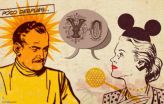Infants raised in bilingual environments can distinguish unfamiliar languages: UBC research
2011-02-20
(Press-News.org) Infants raised in households where Spanish and Catalan are spoken can discriminate between English and French just by watching people speak, even though they have never been exposed to these new languages before, according to University of British Columbia psychologist Janet Werker.
Presented today at the American Association for the Advancement of Science (AAAS) Annual Meeting in Washington, DC, Werker's latest findings provide further evidence that exposure to two native languages contributes to the development of perceptual sensitivity that extends beyond their mother tongues.
Werker has previously shown that bilingual infants can discern different native languages at four, six and eight months after birth. While monolingual babies have the ability to discern two languages at four and six months, they can no longer do so at eight months.
In Werker's latest study with Prof. Núria Sebastián-Gallés from the Universitat Pompeu Fabra in Barcelona, infants of four and six months were shown silent videos of talking faces speaking English and French. They found that babies growing up bilingual with Spanish and Catalan – a Romance language spoken in Andorra and Catalonia – were able to distinguish between English and French simply through facial cues, even though they had never before seen speakers of either language.
"The fact that this perceptual vigilance extends even to two unfamiliar languages suggests that it's not just the characteristics of the native languages that bilingual infants have learned about, but that they appear to have also developed a more general perceptual vigilance," says Werker, Canada Research Chair in Psychology and director of UBC's Infant Studies Centre.
"These findings, together with our previous work on newborn infants, provide even stronger evidence that human infants are equally prepared to grow up bilingual as they are monolingual," Werker adds. "The task of language separation is something they are prepared to do from birth – with bilinguals increasingly adept over time."
###
END
ELSE PRESS RELEASES FROM THIS DATE:
2011-02-20
Predatory fish such as cod, tuna, and groupers have declined by two-thirds over the past 100 years, while small forage fish such as sardine, anchovy and capelin have more than doubled over the same period, according to University of British Columbia researchers.
Led by Prof. Villy Christensen of UBC's Fisheries Centre, a team of scientists used more than 200 marine ecosystem models from around the world and extracted more than 68,000 estimates of fish biomass from 1880 to 2007. They presented the findings today at the American Association for the Advancement of Science ...
2011-02-20
When people on airplanes ask Alan Newell what he works on, he tells them "flower arrangements."
He could also say "fingerprints" or "sand ripples" or "how plants grow."
"Most patterns you see, including the ones on sand dunes or fish or tigers or leopards or in the laboratory – even the defects in the patterns – have many universal features," said Newell, a Regents' Professor of Mathematics at the University of Arizona.
"All these different systems exhibit strikingly similar features when it comes to the patterns they form," he said. "Patterns arise in systems when ...
2011-02-20
WASHINGTON, D.C. — Introductory college science classes need to improve their coverage of issues related to sustainability, a noted chemistry educator told the American Association for the Advancement of Science today.
"Across the nation, we have a problem," said Catherine Middlecamp, a distinguished faculty associate in chemistry at the University of Wisconsin-Madison. "We are using a 20th-century curriculum, and this is the 21st century."
Students, Middlecamp says, want a curriculum that will prepare them for upcoming challenges related to climate change, pollution ...
2011-02-20
Cost-effectiveness analysis should play a bigger role in the American health care system, argued a University of Chicago researcher Friday at the annual conference of the American Association for the Advancement of Science.
"The effects of science and technology on health care costs depend on the policy context in which those technologies are developed and applied," said David Meltzer, Associate Professor of Medicine, in his presentation, "Policies to Mobile Technology and Science for Health Care Cost Control."
Meltzer, who also holds a PhD in economics, pointed out ...
2011-02-20
Adelaide researchers have taken a step closer to the development of a universal flu vaccine, with results of a recent study showing that a vaccine delivered by a simple nasal spray could provide protection against influenza.
University of Adelaide researcher Dr Darren Miller and colleagues have successfully trialled a synthetic universal flu vaccine in mice. The results have appeared this month in a paper in the Journal of General Virology.
"Current flu vaccines rely on health authorities being able to predict what the forthcoming viral strain is going to be, and reformulating ...
2011-02-20
TUCSON, Ariz. (February 18, 2011) -- A University of Arizona College of Engineering researcher and his team who are developing intelligent robots for planetary exploration will be featured in a segment of an upcoming episode of the science program "WaveLengths."
The robots will be featured on the episode premiering Thursday night, February 24 at 8:30 p.m. MST on public television KUAT Channel 6. "WaveLengths" is a quarterly science program hosted by BIO5 Institute Member Dr. Vicki Chandler.
The exploration robots are part of a tier-scalable, reconnaissance system prototype ...
2011-02-20
A study by the University of the Basque Country (UPV/EHU) has carried out the first Spanish study into the emotional differences between the sexes and generations in terms of forgiveness. According to the study, parents forgive more than children, while women are better at forgiving than men.
"This study has great application for teaching values, because it shows us what reasons people have for forgiving men and women, and the popular conception of forgiveness", Maite Garaigordobil, co-author of the study and a senior professor at the Psychology Faculty of the UPV, tells ...
2011-02-20
Patients who undergo elective orthopedic surgeries at high-volume, regional hospitals have better surgical outcomes and experience fewer complications than those who undergo those surgeries at local hospitals, according to research being presented by Hospital for Special Surgery investigators at the 2011 Annual Meeting of the American Academy of Orthopaedic Surgeons (AAOS).
These "regionalizers"—patients who travel to a regional, high-volume hospital—also tend to be younger, white, male and have private insurance, according to the research from Hospital for Special Surgery ...
2011-02-20
Knee replacement surgery takes far more time to conduct in overweight and obese patients than in normal weight patients, according to recent research at Hospital for Special Surgery in New York. The study will be presented at the American Academy of Orthopaedic Surgeons annual meeting, held Feb. 15-19 in San Diego, Calif. The study has implications for hospital staff scheduling surgeries, operating room utilization and personnel staffing, and also raises the question of whether knee replacements should be reimbursed based on time.
"When we schedule surgery, the body mass ...
2011-02-20
For years, doctors have used platelet rich plasma (PRP) to promote healing in various surgeries, but a recent study demonstrates that a type of PRP did not improve healing after rotator cuff repair. The study, conducted by Hospital for Special Surgery (HSS) investigators, will be presented at the upcoming American Orthopedic Society for Sports Medicine (AOSSM) 2011 Specialty Day meeting, held Feb. 19 in San Diego, Calif., following the annual meeting of the American Academy of Orthopaedic Surgeons.
"I would not recommend platelet-rich fibrin matrix [PRFM] as we used it ...
LAST 30 PRESS RELEASES:
[Press-News.org] Infants raised in bilingual environments can distinguish unfamiliar languages: UBC research


